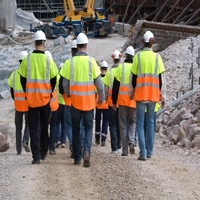Trenching Accidents in the Construction Industry
 The construction industry is a dangerous business and carries a high risk of serious injury and fatality for construction workers. Trenching accidents took the lives of 20 construction workers in 2016 alone. What makes this number even more concerning is the fact that trenching accidents are almost always preventable. Safety training and enforcement of safety protocols are key to keeping construction workers safe from injury and fatality.
The construction industry is a dangerous business and carries a high risk of serious injury and fatality for construction workers. Trenching accidents took the lives of 20 construction workers in 2016 alone. What makes this number even more concerning is the fact that trenching accidents are almost always preventable. Safety training and enforcement of safety protocols are key to keeping construction workers safe from injury and fatality.
A trench is a deep, narrow excavation that construction companies dig to install underground utilities and other infrastructures. Cave-ins and trench collapses result in the highest number of fatalities for trench workers. A load of dirt weighs 3,000 pounds per cubic yard and can quickly bury someone that is working deep in the well of the trench. Falls into trenches, loads falling into a trench, dangerous gases that can cause asphyxiation and explosions, and construction equipment accidents pose even more hazards to trench workers.
The Occupational Safety and Health Administration (OSHA) has established safety standards and mandates to protect those working in trenches. Construction companies, general contractors, and sub-contractors that fail to follow these safety guidelines can be criminally prosecuted and have substantial fines imposed on them.
A New York contractor and sub-contractor were recently convicted of negligent homicide and manslaughter after a 22-year-old construction worker was fatally injured in a trench collapse. Both companies were fined $10,000 by the court and another $100,000 by OSHA. The job site foreman responsible for site safety was sentenced to three years in prison.
It is a common practice for construction companies to offer monetary incentives to contractors and sub-contractors to complete a project on schedule. Unfortunately, contractors may forgo worker safety training to meet the projected schedule. This lack of training puts trench workers at an even higher risk of serious or fatal injury. Monetary incentives are also offered to those who complete construction projects within budget, which leads to some contractors cutting back on safety supervisors and enforcement personnel.
OSHA Safety Guidelines for Trench Workers
OSHA safety guidelines help trench workers avoid serious or fatal accidents when workers are properly trained and supervised. Heavy construction equipment and surcharge loads should be kept away from the often-unstable edges of a trench. Underground utilities should be clearly marked to avoid gas explosions and electrical injuries. Trenches should be inspected before the start of every shift and tested for adequate oxygen levels and hazardous gases and fumes.
Trenches often become unstable during inclement weather conditions, so work should be avoided during heavy rain or snow storms. Careful inspection of the trench should be done before workers are allowed to return to work, with special attention given to the stability of the interior walls and surface edges.
OSHA encourages trench workers to be vigilant and aware of their surroundings and work conditions at all times. Workers should refuse to enter an unstable trench, or to continue work in unsafe conditions. Trench collapses can happen at any time and can quickly become a life-threatening situation.
New Jersey Construction Accident Lawyers at Eichen Crutchlow Zaslow, LLP Help Injured Workers Claim Compensation
If you or someone you know has been injured in a construction accident, the New Jersey construction accident lawyers at Eichen Crutchlow Zaslow, LLP can help you claim the compensation you may be entitled to receive. Call us at 732-777-0100, or contact us online to schedule a consultation today. Our offices are located in Red Bank, Toms River, and Edison, New Jersey, and we serve clients throughout the state.

Eichen Crutchlow Zaslow, LLP has purposely remained small in size, because it is important to us that we get to know our clients and their needs. Larger NJ injury firms may churn out case after case, but that’s not how we operate. Partners Barry Eichen, William Crutchlow, and Daryl Zaslow have created a firm with the resources to handle complex litigation, and a team that takes your case personally.
Find out more about Eichen Crutchlow Zaslow, LLP
